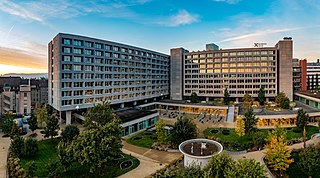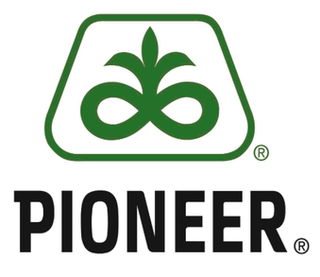The Monsanto Company was an American agrochemical and agricultural biotechnology corporation founded in 1901 and headquartered in Creve Coeur, Missouri. Monsanto's best-known product is Roundup, a glyphosate-based herbicide, developed in the 1970s. Later, the company became a major producer of genetically engineered crops. In 2018, the company ranked 199th on the Fortune 500 of the largest United States corporations by revenue.

Novartis AG is a Swiss multinational pharmaceutical corporation based in Basel, Switzerland. Consistently ranked in the global top five, Novartis is one of the largest pharmaceutical companies in the world and was the fourth largest by revenue in 2022.
Sanofi S.A. is a French multinational pharmaceutical and healthcare company headquartered in Paris, France. The corporation was established in 1973 and merged with Synthélabo in 1999 to form Sanofi-Synthélabo. In 2004, Sanofi-Synthélabo merged with Aventis and renamed to Sanofi-Aventis, which were each the product of several previous mergers. It changed its name back to Sanofi in May 2011. The company is a component of the Euro Stoxx 50 stock market index.

Mary-Dell Chilton is one of the founders of modern plant biotechnology.

Pharmacia & Upjohn was a global pharmaceutical company formed by the merger of Sweden-based Pharmacia AB and the American company Upjohn in 1995. Today the remainder of the company is owned by Pfizer. In 1997, Pharmacia & Upjohn sold several brands to Johnson & Johnson, including Motrin and Cortaid.
Pharming, a portmanteau of "farming" and "pharmaceutical", refers to the use of genetic engineering to insert genes that code for useful pharmaceuticals into host animals or plants that would otherwise not express those genes, thus creating a genetically modified organism (GMO). Pharming is also known as molecular farming, molecular pharming or biopharming.
A biopesticide is a biological substance or organism that damages, kills, or repels organisms seen as pests. Biological pest management intervention involves predatory, parasitic, or chemical relationships.

Genetically modified crops are plants used in agriculture, the DNA of which has been modified using genetic engineering methods. Plant genomes can be engineered by physical methods or by use of Agrobacterium for the delivery of sequences hosted in T-DNA binary vectors. In most cases, the aim is to introduce a new trait to the plant which does not occur naturally in the species. Examples in food crops include resistance to certain pests, diseases, environmental conditions, reduction of spoilage, resistance to chemical treatments, or improving the nutrient profile of the crop. Examples in non-food crops include production of pharmaceutical agents, biofuels, and other industrially useful goods, as well as for bioremediation.

Syngenta AG is a provider of agricultural science and technology, in particular seeds and pesticides with its management headquarters in Basel, Switzerland. It is owned by ChemChina, a Chinese state-owned enterprise.

Pioneer Hi-Bred International, Inc. is a U.S.-based producer of seeds for agriculture. They are a major producer of genetically modified crops with insect and herbicide resistance.

Iprodione is a hydantoin fungicide and nematicide.

Genome Valley is an Indian high-technology business district spread across 2,000-acre (8.1 km2)/(3.1 sq mi) in Hyderabad, India. It is located across the suburbs, Turakapally, Shamirpet, Medchal, Uppal, Patancheru, Jeedimetla, Gachibowli and Keesara. The Genome Valley has developed as a cluster for Biomedical research, training and manufacturing. Genome Valley is now into its Phase III, which is about 11 km from the Phase I and II with the total area approximately 2,000-acre (8.1 km2).
Thierry Bogaert is a Belgian scientist and businessman. He founded the Belgian biotech company Devgen in 1997 and was its managing director and CEO from 1997 onwards, until he sold the Devgen to Syngenta in 2012 for 400m EUR. During this time he led the science and business strategy of the company and took Devgen public on Euronext in 2005. Building on genetics as its core scientific strength, He developed Devgen into a leading provider of new crop protection technologies to the Agro industry and an Asian seed company that fundamentally redesigned Hybrid Rice delivering a pipeline of high yielding products for Indian and South East Asian markets. Prior to its sale to Syngenta, Devgen seeds were produced on >8000 ha and sold in ~20,000 retail shops across India, Indonesia and Philippines.

The Bayer AG is a German multinational pharmaceutical and biotechnology company and is one of the largest pharmaceutical companies and biomedical companies in the world. Headquartered in Leverkusen, Bayer's areas of business include: pharmaceuticals, consumer healthcare products, agricultural chemicals, seeds and biotechnology products. The company is a component of the EURO STOXX 50 stock market index.
BASF Plant Science is a subsidiary of BASF in which all plant biotechnology activities are consolidated. The company was founded in 1998 and employs approximately 700 people at 6 different locations worldwide. The headquarters of BASF Plant Science is located in Research Triangle Park and has research sites in the US, Canada, and Europe. The company mainly develops genetically modified seeds at these locations.
Ceres, Inc. was a biotechnology company based in Thousand Oaks, California, United States that operated from 1996 to 2016, when it was acquired by Land O'Lakes. The company was a spinoff from UCLA researchers. Its ultimate commercial products were seeds of genetically modified crops used for biofuel production. In addition to its operations in the United States, Ceres had a subsidiary in Brazil called Ceres Sementes do Brasil.
Alnylam Pharmaceuticals, Inc. is an American biopharmaceutical company focused on the discovery, development and commercialization of RNA interference (RNAi) therapeutics for genetically defined diseases. The company was founded in 2002 and is headquartered in Cambridge, Massachusetts. In 2016, Forbes included the company on its "100 Most Innovative Growth Companies" list.

Arbutus Biopharma Corporation is a publicly traded Canadian biopharmaceutical company with an expertise in liposomal drug delivery and RNA interference, and is developing drugs for hepatitis B infection.
This is a timeline of Monsanto, a publicly traded American multinational agrochemical and agricultural biotechnology corporation headquartered in Creve Coeur, Greater St. Louis, Missouri.









